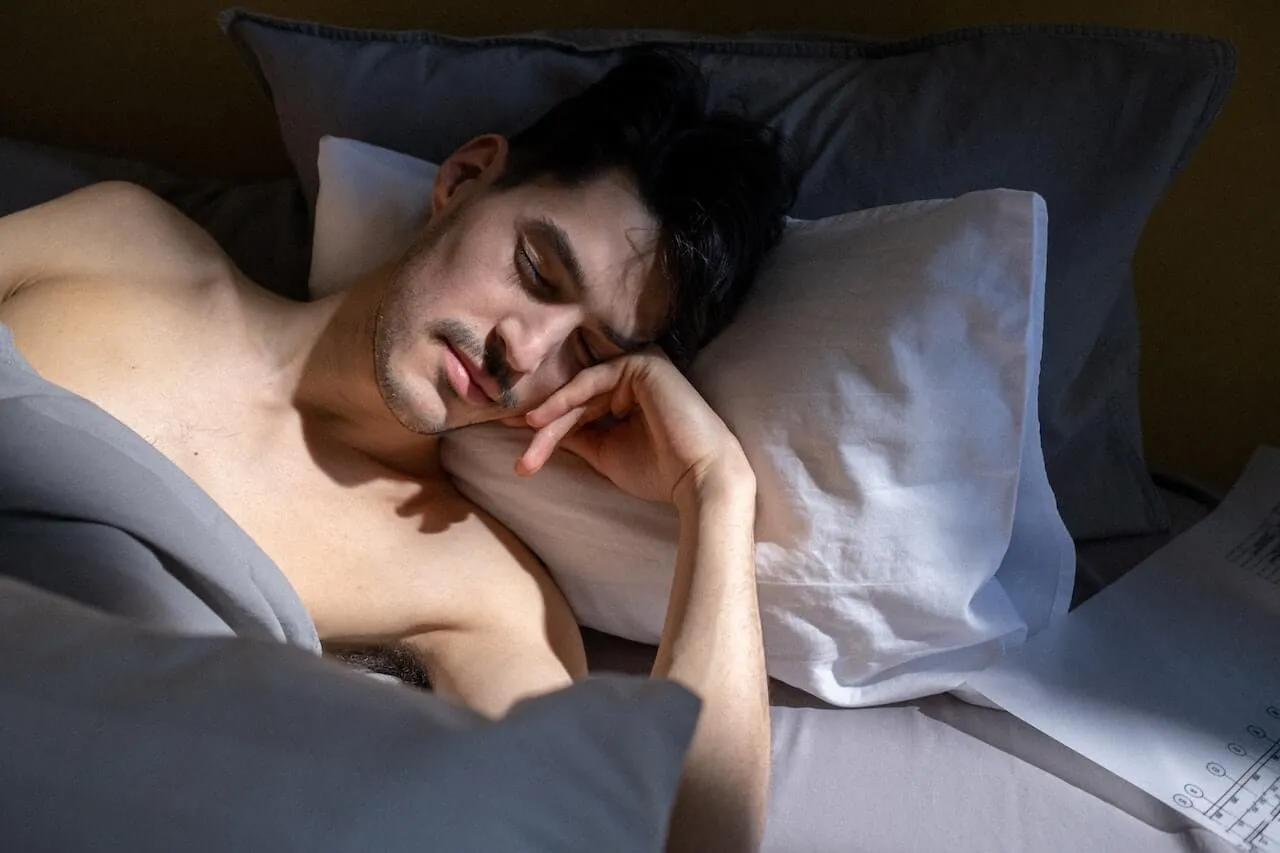Shortness of breath can be common when doing a vigorous activity or exercise. However, difficulty breathing when lying down at night can impact your sleep and may also be a sign of more serious medical conditions, such as orthopnea. The cause could be something as simple as anxiety or related to more complicated pulmonary and cardiovascular conditions requiring urgent attention. Understanding the root cause of your nighttime breathing problem is the key to resolving these symptoms.
4 Factors Likely to Cause Trouble Breathing at Night
Difficulty breathing at night could be an indication of the following conditions:
Lung Conditions:
Allergic conditions
Environmental allergens like dust mites, pet dander, mold, or mildew spores can trigger an inflammatory reaction, making breathing hard.
Pulmonary embolism
A pulmonary embolism, or sudden blockage of the arteries that send blood to your lungs, may cause shortness of breath, chest pain, and heart palpitations.1
Chronic obstructive pulmonary disease (COPD)
COPD develops slowly and may go undiagnosed for many years. Common signs are shortness of breath at night, a persistent cough, and frequent chest infections.2
Pneumonia
Pneumonia is an infection of the air sacs of the lungs. Symptoms can range from mild to severe shortness of breath, fatigue, chest pain, and cough.3
Asthma
Asthma affects more than 20 million people in the US and can result in difficulty breathing, chest tightness, wheezing, and coughing.4
Lung cancer
Lung cancer is the 3rd most common cancer in the US. Symptoms include coughing, wheezing, shortness of breath, and chest pain.10
Pulmonary edema
Pulmonary edema is caused by an unusual accumulation of fluid in the lungs and can cause shortness of breath, especially while lying down. It’s typically caused by heart failure.11

{{mid-cta}}
Heart conditions:
Heart failure
Congestive heart failure occurs when the heart can't pump enough blood to meet the body’s needs. Signs to look for are sudden shortness of breath at night, increased heart rate, lack of appetite, swelling, and fatigue.5
Sleep apnea
Sleep apnea is a serious sleep disorder in which breathing stops and restarts while sleeping. Symptoms include loud snoring, gasping for air during sleep, insomnia, and daytime sleepiness.6
Anxiety and panic attacks
Our mental and physical health are inherently connected, and sometimes stress and anxiety can produce physical symptoms, including chest pain, difficulty breathing, heart palpitations, sweating, and tingling in the extremities.7
Congenital heart defect
A congenital heart defect is a problem with the structure of the heart that people are born with. This can change the way blood flows through the heart, resulting in irregular heart rhythms, shortness of breath, and quickly tiring with activity.8
<p class="pro-tip"><strong>Learn more: </strong> <a href="/blog/sleep-secrets">Unlocking the Secrets of Sleep: A Conversation with Mollie Eastman on Sleep Optimization and Wellness</a>.</p>
Other Conditions:
Acid reflux
Acid reflux is when stomach acid flows back up through your esophagus. Although not directly related to breathing, this condition can cause chest pain, trouble swallowing, and the sensation of a lump in your throat, making it feel like it’s hard to breathe.9
Anemia
Anemia occurs when you don’t have enough healthy red blood cells to transport oxygen throughout your body. The severity of symptoms can vary from mild to severe and include shortness of breath, weakness, heart palpitations, chest pains, and headaches.11
6 Triggers That May Be Causing You Difficulty Breathing at Night
Among all the conditions that cause shortness of breath mentioned above, sleep apnea may be one of the most common and most underdiagnosed. It’s estimated that 30 million people in the US suffer from sleep apnea, while only 6 million have been diagnosed.12
Sleep apnea occurs when the muscles in the back of your throat relax in a way that narrows the airway and prevents you from breathing normally. Your brain recognizes this impaired breathing and wakes you up to reopen your airway and get more oxygen. This can result in waking up with shortness of breath or making a choking or gasping sound. Several factors can contribute to the onset of sleep apnea, including:
Excess Weight
Excess fat around the upper airway can inhibit normal breathing.
Advanced age
As you age, your risk of sleep apnea increases.
Narrowed airways
Sometimes, people are born with narrow airways or have enlarged tonsils or adenoids, making them more susceptible to sleep apnea.
High blood pressure
The risk of sleep apnea increases when you have hypertension.
Smoking
Smoking can damage your airway and increase your risk of developing sleep apnea.
Diabetes
People with severe sleep apnea are more likely to have diabetes and untreated sleep apnea can make it more difficult to manage diabetes.13
5 Side Effects of Trouble Breathing at Night
Trouble breathing at night impacts more than just your quality of sleep. Below are other health complications that can result from nighttime shortness of breath
- Feelings of fatigue or excessive daytime sleepiness
If you're constantly waking up to catch your breath and give your body the oxygen it needs, it’s hard to get a restful night’s sleep. This will leave you feeling overtired, unable to focus, and irritable the following day.
- Heart and blood pressure problems
Decreased oxygen levels throughout the night can make it harder for your cardiovascular system to do its job. Unmanaged sleep apnea can result in heart attacks, heart failure, and stroke.6
- Possible complications with medications and surgery
Anesthesia medications used during surgery relax the upper airway and can exacerbate sleep apnea. Additionally, recovery from surgery typically requires laying on your back, which may worsen breathing problems.6
- Eye conditions
While it’s not fully understood how the two are connected, studies show that people who suffer from sleep apnea are more likely to develop glaucoma.14

How Does Shortness of Breath at Night Get Diagnosed?
If you’re experiencing difficulty breathing at night, consult your doctor immediately. You can work with your doctor to discuss your medical history, evaluate your bloodwork, and perform other diagnostic tests to identify the root cause of your shortness of breath.
Diagnostic testing may include:
- Stress Test
- Sleep Study
- Electrocardiogram (EKG)
- Chest X-ray
What is the Treatment for Shortness of Breath at Night?
Treatment will vary depending on your diagnosis. Based on your medical exam and test results, your doctor will determine the best treatment plan and walk you through new medications or lifestyle changes you should make. Here is what you can expect for some of the more common diagnoses:
- Asthma
If you’re diagnosed with asthma, you will likely be given an inhaler, a portable device that delivers medication directly to your lungs.
- Pneumonia
Treatment will depend on the type of pneumonia you have. If your pneumonia is caused by bacteria, you will be given antibiotic medication.15
- Sleep apnea
The severity of your sleep apnea will determine the treatment. You can make lifestyle changes like losing weight, avoiding alcohol, and sleeping on your side instead of your back. Your doctor may recommend a CPAP machine if your sleep apnea is severe.6
- Allergies
If allergies are triggering your shortness of breath, your doctor may recommend using an air purifier, cleaning your bedroom often to remove potential allergens, and using hypoallergenic bedding.
- Anxiety and panic attacks
You can alleviate anxiety by engaging in stress reduction exercises like yoga, meditation, and breathwork. In some cases, therapy and anti-anxiety medications may be recommended.
When Should You Seek Help?
Shortness of breath is associated with some serious health conditions, so talk to your doctor immediately if you’re experiencing breathlessness regularly. If you have shortness of breath, dizziness, chest pain, fever, blue lips or fingers, or swelling in your extremities, contact emergency medical services.
Using a CGM with Signos: Real-Time Data, Backed by AI
Signos pairs a real-time glucose biosensor with AI trained on tens of millions of data points to deliver personalized, science-backed guidance for weight management and health. See exactly how your body responds, and take action.
Learn how it works. Ready to get started? Join now.
Topics discussed in this article:
References
- https://www.pennmedicine.org/for-patients-and-visitors/patient-information/conditions-treated-a-to-z/pulmonary-embolus
- https://www.nhs.uk/conditions/chronic-obstructive-pulmonary-disease-copd/symptoms/
- https://www.mayoclinic.org/diseases-conditions/pneumonia/symptoms-causes/syc-20354204
- https://acaai.org/asthma/symptoms/
- https://www.heart.org/en/health-topics/heart-failure/warning-signs-of-heart-failure
- https://www.mayoclinic.org/diseases-conditions/sleep-apnea/symptoms-causes/syc-20377631
- https://my.clevelandclinic.org/health/diseases/4451-panic-attack-panic-disorder#symptoms-and-causes
- https://www.mayoclinic.org/diseases-conditions/adult-congenital-heart-disease/symptoms-causes/syc-20355456
- https://www.mayoclinic.org/diseases-conditions/gerd/symptoms-causes/syc-20361940
- https://www.cdc.gov/cancer/lung/basic_info/symptoms.htm
- https://www.mayoclinic.org/diseases-conditions/anemia/symptoms-causes/syc-20351360
- https://www.ama-assn.org/delivering-care/public-health/what-doctors-wish-patients-knew-about-sleep-apnea
- https://health.clevelandclinic.org/sleep-apnea-can-make-managing-diabetes-more-difficult-what-you-need-to-know/
- https://www.aao.org/eye-health/tips-prevention/obstructive-sleep-apnea-glaucoma#:~:text=Studies%20show%20that%20people%20who,two%20diseases%20are%20directly%20related.
- https://www.lung.org/lung-health-diseases/lung-disease-lookup/pneumonia/treatment-and-recovery




.svg)





.webp)


.webp)

.svg)
.svg)
.svg)
.svg)
.svg)
.svg)
.svg)
